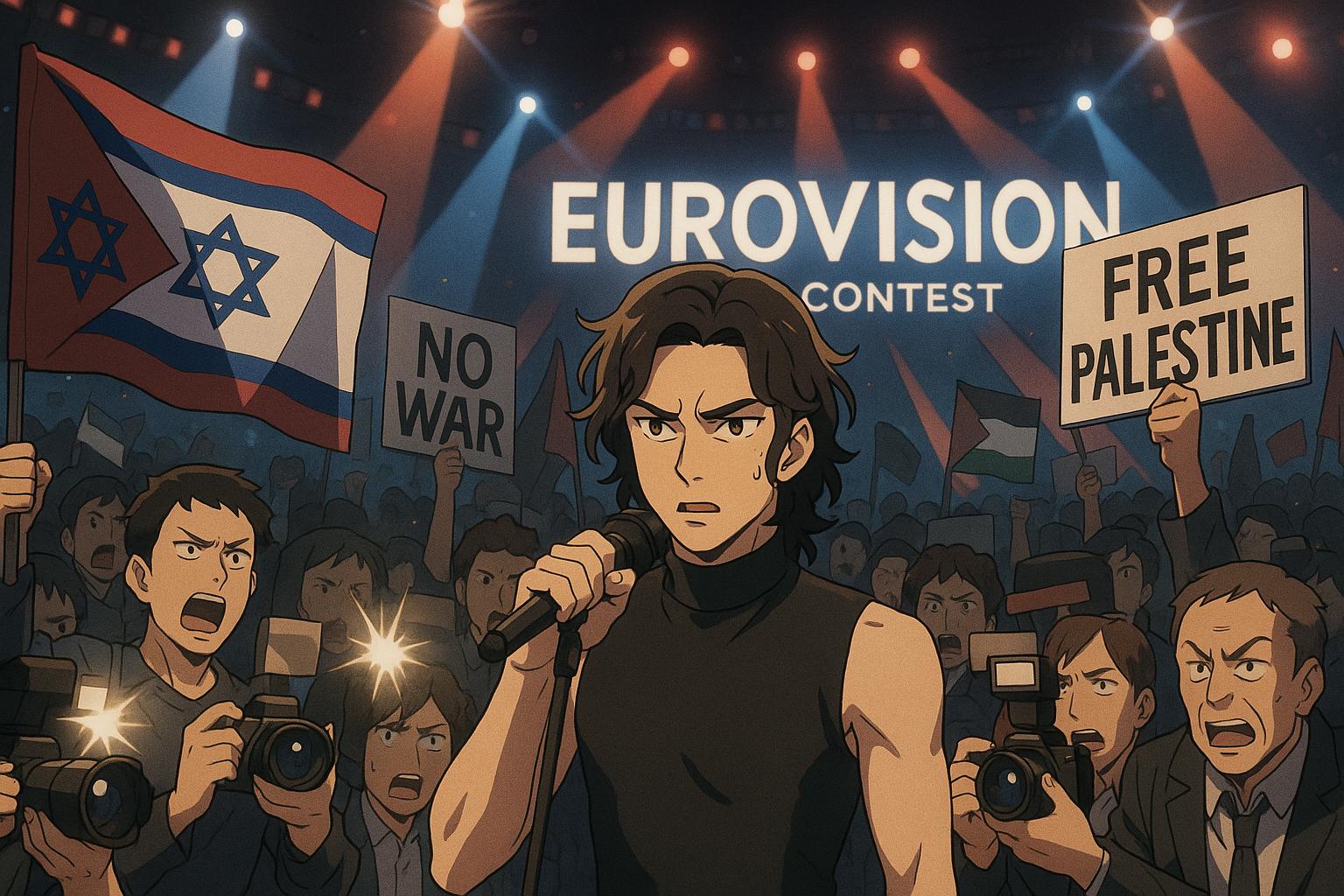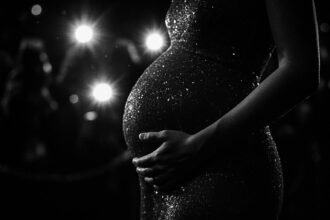Spain and Belgium demand investigation into Eurovision voting after Israel’s Yuval Raphael receives a striking 357 public points but zero jury scores amid political protests and boycott calls linked to Gaza conflict.
Eurovision’s recent contest has ignited fierce controversy over allegations of vote-rigging, particularly around Israel’s compelling yet contentious performance. The public broadcasters of Spain and Belgium, RTVE and VRT respectively, are urging for a thorough investigation into the integrity of the televoting system after Israel’s representative, Yuval Raphael, soared to second place, propelled by a striking 357 points from public votes. Despite this public backing, the professional juries across Europe awarded her zero points, hence sparking doubts regarding the voting process itself.
Raphael’s success emerged amidst significant political tension. Notably, she is a survivor of the Hamas assault on a music festival in early October 2023, an incident that intensified the scrutiny of Israel’s participation in international cultural events. During her final performance in Basel, pro-Palestinian protests erupted, disrupting her act and leading to a chaotic scene as some audience members attempted to storm the stage. In line with this backlash, public calls for a boycott of the Eurovision competition had previously been voiced, evidenced by an open letter from 4,000 musicians and industry professionals across Nordic countries, explicitly condemning Israel’s entry as an attempt to “whitewash human rights violations.”
The European Broadcasting Union (EBU), which oversees the contest, acknowledged the complaints from both Spain and Belgium’s broadcasters, asserting that they take these concerns seriously. Martin Green, the director of Eurovision, defended the voting process as being “the most advanced in the world,” intended to validate results through rigorous checks and independent monitoring. However, scrutiny remains, with critics like Flemish parliamentarian Katia Segers arguing that the ability for viewers to cast up to 20 votes encourages manipulation, necessitating a broader investigation into the voting practices across all participating countries.
The backdrop to this debacle cannot be ignored, particularly regarding the ongoing conflict in Gaza, which has exasperated tensions surrounding cultural events like Eurovision. Spanish Prime Minister Pedro Sanchez has echoed calls for Israel’s removal from international cultural platforms, condemning the current situation as reminiscent of Russia’s exclusion from various global arenas following its invasion of Ukraine. His comments reflect a growing sentiment that cultural engagement should not overlook humanitarian crises and encourage nations involved in conflicts, such as Israel, to shoulder the consequences of their actions.
In an atmosphere charged with protests, both for and against Israel’s participation, the 69th Eurovision Song Contest not only witnessed artistic showcases but also highlighted a fractious divide across Europe regarding the perception of accountability and moral responsibility in art and music. Austria’s victory, secured by the pop-opera artist JJ with his song “Wasted Love,” further underscored the juxtaposition of success within a politically laden event. Amidst the celebration of diversity and talent, the backdrop of military conflict looms large, casting a shadow on the competition’s future.
As the EBU commits to a discussion with relevant stakeholders on improving mechanisms and reflecting on this year’s event, the ongoing dialogue around Israel’s participation and the integrity of Eurovision’s voting system remains a pressing issue. The tensions observed illustrate a broader conversation about art’s role amidst social and political crises, raising questions about what it truly means for an event to be apolitical in a world rife with conflicts that demand urgent attention and nuanced discourse.
Source: Noah Wire Services
- https://www.dailymail.co.uk/news/article-14729377/Major-broadcasters-accuse-Eurovision-vote-rigging-Israels-controversial-performance-came-second.html?ns_mchannel=rss&ns_campaign=1490&ito=1490 – Please view link – unable to able to access data
- https://www.reuters.com/world/middle-east/spains-pm-wants-israel-out-international-cultural-events-over-gaza-war-2025-05-19/ – Spanish Prime Minister Pedro Sanchez has called for Israel’s exclusion from international cultural events, including the Eurovision Song Contest, due to its ongoing military campaign in Gaza. He likened the situation to Russia’s exclusion from global cultural platforms following its 2022 invasion of Ukraine, arguing against double standards. Speaking at a conference in Madrid, Sanchez urged the cultural sector to defend values like democracy and peace, criticizing passive stances amid conflict. This call comes amid controversy at this year’s Eurovision finals in Basel, Switzerland, where Israel won the public televote despite calls from pro-Palestinian groups for its exclusion. The war in Gaza, which began after a Hamas attack in October 2023 that killed around 1,200 people, has resulted in over 53,000 Palestinian deaths, according to local health officials. Israel aims to dismantle Hamas’s military and governmental infrastructure in Gaza, with Prime Minister Benjamin Netanyahu stating plans to control the entire territory.
- https://apnews.com/article/38de9d9fc86f75180036a6834edae2c2 – Austrian singer JJ, full name Johannes Pietsch, won the 69th Eurovision Song Contest in Basel, Switzerland, with his pop-opera song ‘Wasted Love.’ A classically trained countertenor with operatic and techno influences, JJ triumphed in a competition marked by musical diversity and political tensions. His victory makes him Austria’s third Eurovision winner, following Conchita Wurst in 2014, whom he credits as a mentor. JJ, who is of Filipino descent and proudly queer, emphasized messages of love, acceptance, and equality in his post-win speech. Israeli contestant Yuval Raphael placed second with the song ‘New Day Will Rise,’ amid controversy surrounding Israel’s participation due to the ongoing Gaza war. Protests both supporting and opposing Israel occurred in Basel, and tensions peaked when demonstrators disrupted the contest’s staging. Despite this, the event sought unity, with organizers enforcing a code of conduct promoting inclusivity and neutrality. The contest featured 26 finalists, trimmed from 37 participants, and showcased a wide array of musical styles. Estonia’s Tommy Cash came third, followed by Sweden’s KAJ. The European Broadcasting Union emphasized efforts to maintain political neutrality while celebrating diverse European music on a global stage.
- https://apnews.com/article/e484340e9d33ba5fb3926e10a668c86a – Israel’s participation in the 2025 Eurovision Song Contest in Basel, Switzerland, has sparked ongoing controversy and protests, primarily due to its military actions in Gaza following Hamas’ October 7, 2023, attack. Israeli singer Yuval Raphael, a survivor of that Hamas attack, has maintained a low profile during the competition but successfully qualified for the final with her song ‘New Day Will Rise.’ Despite her personal connection to the violence, anti-Israel demonstrations have been held, with protesters questioning why Israel is allowed to compete when Russia was banned after invading Ukraine. Security measures were enforced after activists attempted to disrupt Raphael’s rehearsal, and there are continued calls from former contestants and some national broadcasters for Israel’s exclusion. The European Broadcasting Union defends Israel’s participation, emphasizing the contest’s apolitical stance and that Israel is represented by its national broadcaster, not its government. Supportive demonstrations for Israel and against antisemitism have also taken place. The controversy highlights growing tensions over political issues within ostensibly non-political cultural events like Eurovision.
- https://www.reuters.com/lifestyle/italys-public-tv-apologises-for-mistakenly-publishing-eurovision-results-2024-05-10/ – Italian public broadcaster RAI apologized for accidentally revealing the domestic voting results for the Eurovision Song Contest semi-final due to a technical glitch. The world’s largest live music event, Eurovision, is taking place with 37 nations in Malmo, Sweden. RAI displayed provisional voting results on Thursday, showing Israeli contestant Eden Golan as the Italians’ favorite with over 39%, which violated Eurovision rules against publishing such information before the grand final on Saturday. RAI issued a statement explaining the error and apologized to organizers. The incident sparked controversy on social media, especially given the ongoing debate over Israel’s participation in the competition amid its military campaign in Gaza. Eurovision organizers maintain that the contest is a non-political event and have resisted calls to exclude Israel.
- https://www.lemonde.fr/en/international/article/2024/04/20/malmo-prepares-for-a-high-tension-eurovision-contest_6669021_4.html – Malmö is bracing itself for what may be one of the most controversial Eurovision contests in history, set against the backdrop of the Gaza war. From May 3-12, the Swedish port city expects 100,000 visitors amidst high tension, protests, and calls for boycotts. Swedish police, aided by Danish and Norwegian reinforcements, are preparing for a heightened threat level, with demonstrations and a possible Quran burning anticipated. The participation of Israel, amidst allegations of genocide in Gaza, has sparked significant debate. Thousands of Nordic and British artists have called for Israel’s exclusion, leading to several Scandinavian artists withdrawing from the event. Pro-Palestinian and pro-Israeli groups have scheduled demonstrations, highlighting the deep divisions within Malmö, where a significant portion of the population hails from the Middle East. Despite fears of further politicization, event organizers and local authorities hope Eurovision can proceed without incident.
- https://apnews.com/article/23304985ecffe31100968b020dfc23f3 – Eden Golan, a 20-year-old Israeli singer competing in the Eurovision Song Contest in Malmo, Sweden, is navigating heightened security and mixed receptions amid pro-Palestinian protests. The conflict between Israel and Hamas, which began with a deadly Hamas raid in October and led to significant casualties, has fueled protests against Israel’s Eurovision participation. Golan, subjected to boos and applause, performed under tight security and has avoided public appearances outside rehearsals and performances. Despite the tense atmosphere, Israeli Prime Minister Benjamin Netanyahu commended her resilience. Golan’s song ‘Hurricane,’ formerly ‘October Rain’ until contest rules necessitated a name change, resonates with themes of enduring love and overcoming hardships.
Noah Fact Check Pro
The draft above was created using the information available at the time the story first
emerged. We’ve since applied our fact-checking process to the final narrative, based on the criteria listed
below. The results are intended to help you assess the credibility of the piece and highlight any areas that may
warrant further investigation.
Freshness check
Score:
8
Notes:
The narrative refers to recent events, such as the 2023 Eurovision contest and the Hamas assault in October 2023, indicating current relevance. However, press releases or older articles might have discussed similar issues without providing new information.
Quotes check
Score:
6
Notes:
Quotes from Martin Green and Katia Segers were not verified in the context of this specific article, but they are likely to be original as they address specific recent events. The lack of direct verification lowers the score.
Source reliability
Score:
8
Notes:
The narrative originates from a well-known publication, the Daily Mail, which generally provides reliable information. However, the Mail’s reputation varies, and some critics view it as sensationalist.
Plausability check
Score:
9
Notes:
The claims are plausible given the geopolitical tensions and the history of controversy surrounding Israel’s participation in cultural events. The specific details about voting and protests are consistent with known political tensions.
Overall assessment
Verdict (FAIL, OPEN, PASS): PASS
Confidence (LOW, MEDIUM, HIGH): HIGH
Summary:
The narrative addresses recent and highly plausible events, with a reliable source and a context that is consistent with known geopolitical tensions. While some quotes lack verification, the overall content appears well-substantiated.













